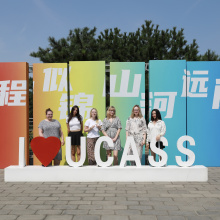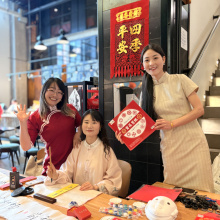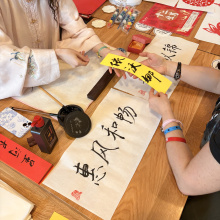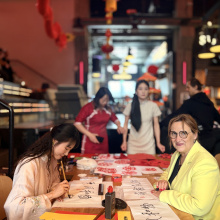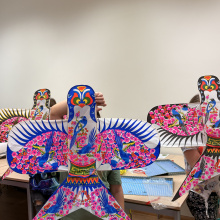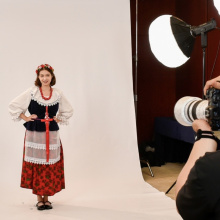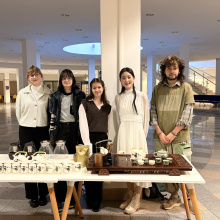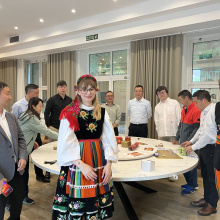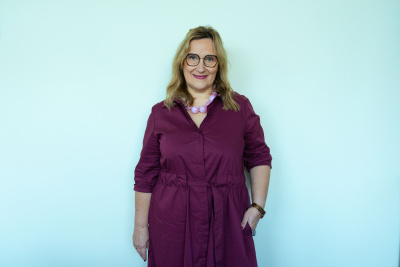
Magdalena Nieczuja-Goniszewska talks to prof. dr hab. Aneta Lewińska, Director of the Confucius Institute at the University of Gdańsk, on the occasion of its anniversary.
- Efforts to establish the Institute began in 2009, but it was not opened until six years later. In October, we will celebrate its tenth anniversary. From your perspective, how has the Institute changed over the past ten years?
- The Confucius Institute was established, like all such institutions, to promote Chinese culture. This is done in many ways. However, I will talk about my perspective, because my cooperation with the Institute was completely different for many years than it is now, and I perceived the institution differently. For many years, I observed the activities of the Confucius Institute from the perspective of a person teaching Polish as a foreign language to students from China, which I have been doing since 2010. Currently, as the Director of the Confucius Institute, I observe how Chinese is taught as a foreign language in Poland. In recent years, Chinese has entered the arena of popular, recognised, and international languages. I think this change is also related to the evolution of the Confucius Institute itself. Today, Chinese occupies a completely different place in the multilingual space than it did a decade ago and, as a result, the Institute itself plays a different role at the university. Initially, it was established together with Sinology, which we created at the Faculty of Languages, and it was an opening of the Faculty of Languages to the languages of the Far East. Today, we also have Japanese studies, so a change in this direction is taking place, albeit slowly.
As it developed, the Confucius Institute expanded its activities beyond the university. We provide a lot of services outside the academic community. From the very beginning, the Confucius Institute sought cooperation with schools, initiating the creation of an experimental Chinese language class at School Complex No. 1 in Gdańsk. Today, other schools where we teach Chinese have joined our group of partners. And we continue to receive requests from many schools to establish regular cooperation. At present, we are not able to fully meet these needs. However, it can be said that cooperation with schools has certainly developed significantly over the past 10 years. I think this is also partly due to the fact that a lot of private and affiliated schools are being established around the University. These schools are, by their very nature, more open to new experiences. We cooperate, for example, with the Thinking Zone school, the Academy of Good Education, and the Gdańsk Autonomous High School, but at the same time, our partners include the Conradinum Shipbuilding and Technical Schools, which probably have one of the longest educational traditions in Gdańsk. And last year, for the first time, we started working with a nursery school. We cooperate with the ‘Marchewka’ nursery school chain, where our young teachers, who are native speakers, teach Chinese to children as part of extra-curricular activities. And I must emphasise that it is not us who are looking for partners, but our partners who are looking for us.
- Why are schools so eager to cooperate with the Confucius Institute? What makes you stand out?
- The appeal of the Confucius Institute lies in the fact that it provides native speakers. My contribution to this programme of cooperation with schools was the introduction of cultural assistance, as a result of which we send students of Sinology and Eastern studies to schools, who, as part of their internships, act as support teachers, cultural assistants and liaisons between Chinese teachers and students. This has worked very well, especially in the younger classes and in kindergarten. Interestingly, in kindergarten, teaching takes place without an intermediate language, because three- and four-year-olds do not speak English, so it is learning through play, using modern methods of foreign language teaching. Hence the presence of students who mainly act as cultural assistants, rather than language assistants. There are significant differences between the Polish and Chinese education systems, compounded by cultural differences, and Chinese teachers sometimes find it difficult to find their feet in the Polish school system, while pupils find it difficult to adapt to Chinese culture. And this assistantship has worked perfectly. In the nursery school, students support the teaching of Chinese by meeting with the children again. One day a week, native speakers and our students are present in the lessons, and on the second day of the week, only our students are there to repeat the material with the children. It also opens up the job market for our Chinese studies graduates, showing them various opportunities. I think everyone benefits from this project: the youngest Chinese language learners, Chinese teachers and students.
- Is there any demand for students of this field?
Here I must mention the second area of activity of the Confucius Institute - cooperation with our socio-economic environment, with businesses. These are primarily companies related to shipbuilding and transport. That is where our Chinese studies students are needed. However, the job market that is now opening up for them is the teaching market. Unfortunately, we do not offer a teaching specialisation in our Chinese studies programme, but these teaching and lecturing skills can be acquired through postgraduate or teacher training programmes. There is a noticeable increase in interest in the Confucius Institute, also in the number of people taking Chinese language certification exams, and they are no longer recruited only from among our students.
HSK egzam, 09.03.2025
- Professor, speaking of certificates and exams, what do the abbreviations HSK and HSKK mean?
- The first one, HSK, is the Chinese abbreviation for the name of an international language proficiency exam, Hanyu Shuiping Kaoshi (in English: The Chinese Proficiency Test), and it is a written exam. The second, HSKK, stands for Hanyu Shuiping Kouyu Kaoshi, which is an oral exam testing speaking skills. Conducting this second exam is a technical and logistical challenge, as the oral exam is recorded on media - dictaphones or directly in sound recording booths. It is not like the certification we are familiar with, where there is a committee that talks to each candidate live, but rather all candidates taking this exam are recorded. Headphones and a large space must also be provided. We use language laboratories, i.e. three rooms with a system that we have in the Modern Languages building, and we have one room here at the Confucius Institute. I think we are able to record a hundred people at the same time. The recordings are then sent to China and checked there. During one of these exam sessions, the first during my term of office, a total of 205 exams were conducted at 6 levels in writing and 3 levels in speaking.
- That's a lot of recordings. How long does it take to check them and award the certificate?
- The results of the written exam take about two weeks, and the results of the oral exam take a month. This exam is valid for academic purposes for only two years and must be renewed. From my perspective as a psycholinguist or sociolinguist, this is a very interesting idea, because language skills in an unused language tend to fade away.
Returning to the exam itself, our role as an examination centre is to prepare and conduct the exam and supervise its progress. Therefore, I would like to thank Pas Tomasz Kawa and Pas Michał Bocheński for their technical support and unwavering patience with equipment and people.
- What other tasks does the Confucius Institute have?
- We also act as intermediaries in obtaining Confucius scholarships, which open up the possibility of studying in a native environment for students of the University of Gdańsk, but not only for them, also for our course participants. These scholarship programmes are huge. Applicants must have passed and have a current HSK and/or HSKK exam, depending on the programme. So we have many examinees, because they also have the opportunity to apply for various scholarships. Last year, we also organised the Chinese Bridge. This event is sponsored by the Chinese Embassy in Poland. It takes place almost simultaneously around the world in different age categories. Winners from each country take part in the final organised in China. In this year's Polish national finals in two age categories, the winners were people associated with our Confucius Institute and our Sinology department: among students, the best was Kinga Kizner, a Sinology student (UG), and among secondary school students, Artur Simkin, a student from GLA, where our teachers conduct Chinese language lessons.
A very spectacular event took place in the lecture halls of the University of Gdańsk. Chinese Bridge is a competition of knowledge of the Chinese language, but also of Chinese culture. All participants performed in traditional Chinese costumes and presented their talents, such as playing instruments, singing, calligraphy and dancing. The audience could admire the beauty of Chinese culture and follow the efforts of young artists live. Thanks to the technical preparation of the halls, the audience could watch the process of creating works of art filmed live on a large screen.
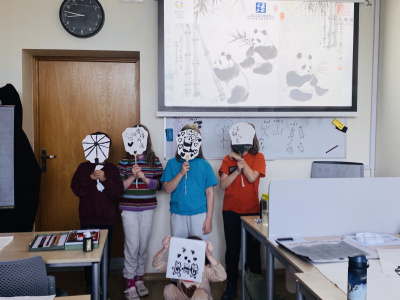
'Chinese kites' - workshops for primary school
- Does this mean that learning a language at the Institute is not just about memorising words, phrases and so on, but also about learning calligraphy?
- Yes, it means that the main activity of the Confucius Institute is to promote the Chinese language and culture. This promotion also takes place during language classes, of course, but the lessons are accompanied by culture. We have a beautiful calligraphy studio at the Institute, where we hold workshops on writing characters, and a tea room, where we present traditional methods of brewing Chinese tea. The Institute also has a rich collection of materials for learning and cultural workshops, such as the traditional art of paper cutting. The Institute also has a sizeable library, which we want to open to students of Sinology.
We are currently inventorying the collections. You ask how the Institute has changed over the last 10 years - well, for one thing, the library has grown, but unfortunately it has not been catalogued. The collection is larger than what is needed for the courses at the Institute, so together with the Director of the UG Library, prof. Arnold Kłonczyński, and the Chinese Studies authorities, we have decided that there will be a room in the library of the Faculty of Languages, and when we finish the stocktaking, we will transfer part of our collection to the library of the Faculty of Languages. The books will be where the sinology students are. And then these books will leave the beautiful display cases of our institute. They will get a new lease of life. However, we would also like to encourage the community of other universities in the Fahrenheit Union of Universities in Gdańsk to take advantage of the resources and offerings of the Confucius Institute. Last year, we launched language courses at reduced prices for FarU students. This year, we are also offering tai chi classes at a special price for Fahrenheit students. We also invite university staff to apply for discounts on these courses.
As for the Chinese language courses themselves, this year we have a record number of enrolments: 150 people have chosen our offer. In total, we run nine different courses. We also have courses for children with the charming name Panda.
- How many staff members do you have?
- We have six lecturers. Three of them are experienced teachers of Chinese as a foreign language, and the other three are final-year students of Chinese as a foreign language from our partner university in Beijing (UCASS), who join our team every year.
I would like to establish closer ties between the IK staff and Gdańsk's sinology department, especially with young student teachers. I am trying to get sinology students to mentor these teachers. They come to us and from the very first days of their stay they teach at the school, learn about a different system and a different culture. It is definitely worth ensuring that they find friends and guides among Polish sinology students. Since last year, our lecturers have also been supported by Polish philology students who, as part of their internship in teaching Polish as a foreign language, conduct Polish language lessons for our Chinese teachers, including elements of peer tutoring in their practice.
Students (interns and volunteers) from Sinology and Eastern Studies provide invaluable support to our Chinese staff. They work together with Chinese teachers in schools, catalogue the library and participate in all organised events, such as competitions, certification exams and Chinese New Year celebrations. The latter event in particular was a success thanks to the support of many friends of IK. It was my first big organisational challenge. It was a success, as Professor Limon's lecture hall was filled to capacity.
Summer school of 2024
- Is your offer limited only to the university and school space, or do you also take advantage of the presence of, for example, Chipolbrok and companies related to the local markets?
- The Chinese community living here in our province finds a substitute for their homeland at the Confucius Institute. By organising Chinese New Year in an open format, we give Poles the opportunity to learn about the distant culture of the Middle Kingdom, while at the same time offering Chinese people living in the Tricity the opportunity to celebrate in Chinese culture, which is extremely important for people living here on short or long-term emigration. It is a bit like imagining the Polish diaspora celebrating Christmas Eve away from home.
At the same time, we strive to conduct intercultural dialogue and, using the potential of the University of Gdańsk, promote Polish culture in the Chinese community. For example, we conducted workshops on Polish culture in Chipolbrok, responding to the interest of a Chinese company. An amazing event was the joint performance of the Jantar ensemble, Chinese teachers from the IK and students of Sinology. The young artists delighted the Polish and Chinese audiences with their presentation of Polish and Chinese costumes and regional dances, which is why, at the request of the Chinese director of the Confucius Institute, we are repeating this choreography on 25 October. Our culture delights the Chinese.
- You also have Chinese regional costumes at the Confucius Institute, right?
- Yes, we have accumulated a lot of things here over the past 10 years. Directors and administrative staff have changed, and various collections have been added, so we spent the entire summer doing a stocktaking of all our resources. The institute has a substantial collection of ethnic minority costumes.’ A few days ago, we received another set from our Chinese partner (UCASS) - this time traditional Chinese costumes - hanfu and quipao. The ones we showed during the Chinese New Year celebrations in January were borrowed (courtesy of the Confucius Class of the Jagiellonian Academy in Toruń). During the stocktaking, we discovered many truly valuable items, such as a Buddha figurine from 1900.
- What are your plans for the coming months and years of the Confucius Institute?
- The most immediate one is the 10th anniversary celebration of the Confucius Institute, to which we invite you. My idea is to bring the Institute closer to the students of the University of Gdańsk - Polish, international and, as I mentioned, students from FarU. This academic year, we want to organise a language tea room, where different languages would be celebrated on different days. We would create a space for meeting and conversation over tea, which is an important drink in many cultures. Perhaps we could organise a Chinese day and an English day this academic year. We also have plans to collaborate with our immediate surroundings. We want to invite children from families where one or both parents are from China. My PhD student, Liu Zixuan, is preparing her thesis on the linguistic and cultural identity of Chinese people living in Poland, so I know from her that there are families in the Tricity who would like to maintain their children's bilingualism. We could open a Toddler Club for these children here. I have already spoken to our Jantar and we are also considering how to involve these children in the activities of Mały Jantar. I would like the Confucius Institute to become part of the broader activities of the University of Gdańsk and FarU related to supporting multilingualism and multiculturalism in the academic community and beyond.
- What would Professor say to those who believe that Chinese culture should not be promoted for political reasons?
- First of all, I have fifteen years of personal experience working with students from Harbin, and I think it is worth separating the promotion of culture and language from political issues. I know that language can also be a tool of politics, a tool of propaganda, but language is also a window into culture, a space where you can really understand this other world. And we are not talking today about learning a language in the communicative sense, because the communicative method, which was still considered the most modern 10 years ago as a result of technological progress - the development of the Internet, social media and AI - no longer meets the most important goals of language teaching. Communication without knowledge of the language is becoming easier and easier; even the simplest phone will help us navigate the world, becoming our translator for almost any language. Moreover, simplified iconographic communication allows us to meet our basic needs in any country without knowing any language. But without knowledge of the language, we will not get to know another person, we will not enter their world, we will not get to know their culture. Language is a meeting place. Only later can we observe how politics works in that language, how propaganda works. And in order not to remain a passive tool of this propaganda, it is worth learning the language yourself and also getting to know the world in which people grow up, in which their value system, encoded in language, is formed. Because you can only understand another person when you understand their world. Then we will have the opportunity to engage in dialogue. And what we see behind the words, the world that lies behind the words, depends on our own competence, on our ability to read all the linguistic mechanisms that allow us to be manipulated in any language.
- Thank you for the interview.

